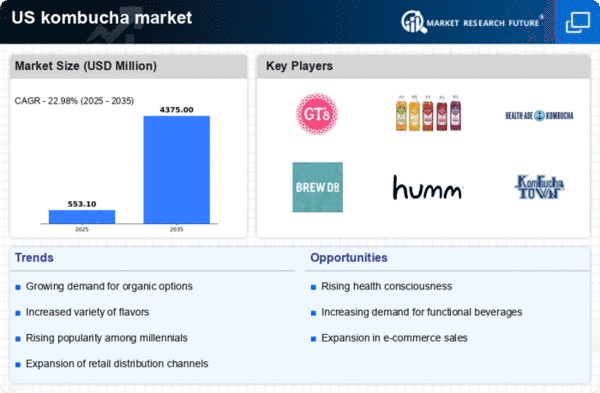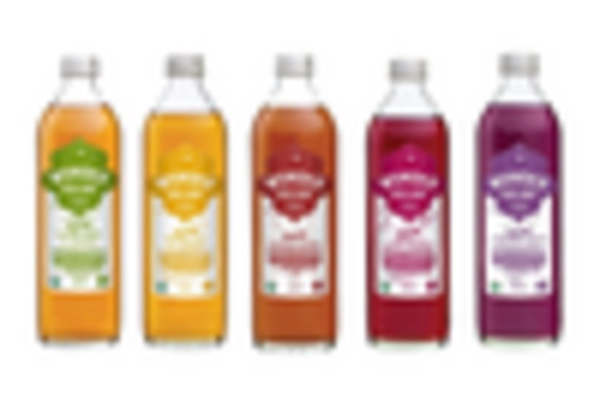Expansion of Flavor Profiles
The kombucha market is characterized by an ongoing expansion of flavor profiles, catering to diverse consumer tastes and preferences. As the market matures, brands are experimenting with unique flavor combinations, incorporating fruits, herbs, and spices to create innovative offerings. This trend is supported by market data indicating that flavored kombucha accounts for over 70% of total sales, highlighting consumer demand for variety. The introduction of seasonal and limited-edition flavors also generates excitement and encourages repeat purchases. Additionally, the rise of craft kombucha producers has contributed to this flavor diversification, as these smaller brands often prioritize creativity and experimentation. As consumers continue to seek novel taste experiences, the expansion of flavor profiles is likely to remain a key driver in the kombucha market.
Increased Retail Availability
The expansion of retail channels is significantly impacting the kombucha market, as more consumers gain access to these beverages. Major grocery chains, convenience stores, and health food retailers are increasingly stocking kombucha products, making them more accessible to a broader audience. This trend is supported by data indicating that kombucha sales in retail outlets have grown by over 30% in the past year alone. The increased visibility of kombucha in stores not only boosts sales but also raises consumer awareness about the product's health benefits. Furthermore, the rise of e-commerce platforms has facilitated online purchasing, allowing consumers to explore a wider variety of brands and flavors. As retail availability continues to expand, the kombucha market is likely to see sustained growth, appealing to both new and existing consumers.
Innovative Marketing Strategies
Innovative marketing strategies are playing a crucial role in shaping the kombucha market. Brands are increasingly leveraging social media platforms and influencer partnerships to reach target audiences effectively. This approach appears to resonate particularly well with younger consumers, who are more likely to engage with brands that utilize authentic storytelling and relatable content. Additionally, promotional campaigns highlighting the health benefits of kombucha, such as its probiotic content, are gaining traction. Data suggests that brands employing these strategies have seen sales increases of up to 25% within specific demographics. As competition intensifies, the ability to differentiate through creative marketing will likely be a key driver for growth in the kombucha market, enabling brands to capture consumer interest and loyalty.
Rising Demand for Functional Beverages
The kombucha market is experiencing a notable surge in demand for functional beverages, driven by consumers' increasing interest in health and wellness. This trend is reflected in the market's growth, with the kombucha segment projected to reach approximately $1.5 billion by 2026. As consumers seek beverages that offer health benefits, such as improved digestion and enhanced immunity, the kombucha market is well-positioned to capitalize on this shift. The rise of health-conscious consumers, particularly millennials and Gen Z, is likely to further propel the market, as these demographics prioritize products that align with their lifestyle choices. Additionally, the availability of various flavors and formulations enhances the appeal of kombucha, making it a preferred choice among those looking for healthier alternatives to traditional soft drinks.
Consumer Preference for Natural Ingredients
The kombucha market is witnessing a shift towards natural and organic ingredients, reflecting broader consumer preferences for clean-label products. As awareness of artificial additives and preservatives grows, consumers are increasingly seeking beverages that are free from synthetic ingredients. This trend is evident in the rising demand for organic kombucha, which has seen a growth rate of approximately 20% annually. Brands that emphasize transparency in their ingredient sourcing and production processes are likely to gain a competitive edge. Furthermore, the incorporation of superfoods and functional ingredients into kombucha formulations is becoming more prevalent, appealing to health-conscious consumers. This focus on natural ingredients not only aligns with consumer values but also enhances the overall perception of kombucha as a healthful beverage choice.
















